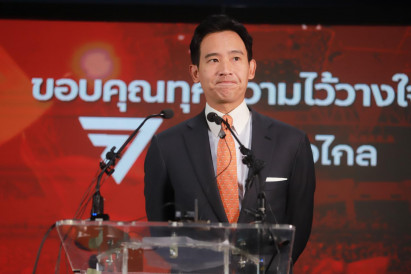Fate may hang on iTV’s legal status

Move Forward Party (MFP) leader Pita Limjaroenrat is not out of the woods yet, despite having transferred the controversial shares he held in iTV to his relatives.
Mr Pita, who is being investigated over 42,000 shares he held in the company, said on Tuesday he had transferred them to ensure he could be the next prime minister amid attempts to block him from entering the government.
Jade Donavanik, a legal expert and former adviser to charter drafters, said Mr Pita’s fate hinges on the question of whether iTV, an independent broadcaster founded in the 1990s, is still considered a media firm.
Under the current constitution, an election candidate is barred from running for office if they own shares in a media company.
Mr Jade said the transfer is unlikely to make any difference because Mr Pita is the statutory heir, and he did not make the change until after the May 14 general election.
However, the status of iTV is not clear as its status is being considered in the Supreme Administrative Court.
Mr Jade said the share-holding rule has been in place for several years, and election candidates are fully aware of share ownership following the case of Thanathorn Juangroongruangkit, former leader of the now-dissolved Future Forward Party (FFP), a precursor to the MFP.
Mr Thanathorn was stripped of his MP status as he was found to hold 675,000 shares in V-Luck Media Co when the FFP submitted the names of its party-list MP candidates to the Election Commission (EC).
Pattana Ruanjaidee, a law lecturer at Ramkhamhaeng University, said he did not think the media shares would affect Mr Pita’s political career.
He said the MFP leader did not see himself as the shareholder but rather as the manager of his late father’s estate, and also, he did not consider iTV to be a media firm. However, his complainant viewed the matter differently.
He said he agreed with Mr Pita that iTV is not actively engaged in media operations, and he does not believe Mr Pita can exert influence over the company, which would be a major bone of intention.
“I don’t think this issue will cause any problem. It’s the Senate that doesn’t make decisions based on legal facts, as it’s dominated by coup-makers,” he said.
Somchai Srisutthiyakorn, a former member of the EC and chief strategist of the Seri Ruam Thai Party, wrote on Facebook that Mr Pita’s former ownership of the shares is unlikely to make him ineligible to seek nomination as prime minister because parliament has not yet started the selection process. However, his critics may argue the rule should be applied from the day Mr Pita was proposed as the MFP’s prime ministerial candidate.
“Selling the shares after the election is unlikely to benefit his case. And selling them looks like an admission of guilt,” he wrote.
Mr Somchai said the powers that be are doing all they can to resist change.
Mr Pita posted on Facebook that attempts were being made to revive iTV as a mass media organisation in a bid to attack him.
He wrote that in its 2018-2019 financial statement, iTV was defined as a holding company, but in two following financial statements, it was labelled a TV organisation.
At the iTV shareholders’ meeting on April 26 this year, one shareholder asked if it was a media organisation. “Was the question politically motivated?” Mr Pita wrote on Facebook.
His family concluded he should transfer the shares in case there are “attempts to revive iTV as a media organisation”, Mr Pita wrote, adding he had held them since March 16, 2007, as manager of his late father’s estate.
He expressed confidence that nothing would disqualify him from serving as a lawmaker or becoming prime minister.

